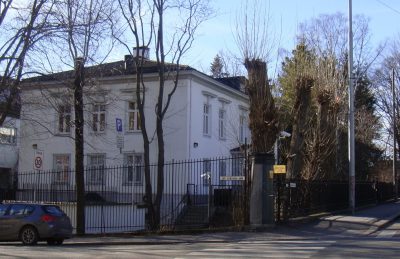The Russian Embassy in Oslo has issued some complaints of its own, after Norwegian intelligence agency PST tied a “pro-Russian” organization to the recent hacking of the Norwegian Conservative Party’s website. Embassy officials claim they’re growing increasingly weary of being blamed for such cyber attacks.
 The Russian Embassy in Oslo. PHOTO: NewsinEnglish.no
The Russian Embassy in Oslo. PHOTO: NewsinEnglish.no
Conservatives leader Erna Solberg, who’s also a prime ministerial candidate in Monday’s Parliamentary election, had said she thinks the attack on her party’s website was timed to interfere with the upcoming election. She also said she thinks the Russians are trying “to create unease and uncertainty” during the final days of the election campaign.
Now the Russian Embassy in Oslo has fired back, claiming anyone could have been behind the hacking. In an email to Norway’s largest newspaper Aftenposten, embassy officials wrote that the cyber attack could have been merely a provocation, or a so-called “false-flag” operation carried out by players in Norway itself or other countries. They could be keen, claimed the embassy, on giving Russia the blame in order to “discredit us” and further worsen relations between Russia and Norway.
The message from the Russian Embassy further claimed that there was no basis for the Conservatives’ complaints, nor would the embassy rule out that the party itself was posing as a victim “to score political points by playing the Russian, or the anti-Russian, card.”
The Conservatives’ secretary general Tom Erlend Skaug retorted that it was important for the party to be open about the risk of cyber attacks, that PST itself had found evidence of a pro-Russian organization taking credit for the attack and had warned of attempts by Russia to influence Norway’s national election.
“The Conservatives don’t know what the explicit motive was for the incident (when their website was knocked out by the attack), but we have pointed to what Norwegian intelligence services have openly written about on this,” Skaug wrote in his own message to Aftenposten. He added that “we can’t be naive” about what motives were behind the hacking.
‘Typical’ Russian communication
The embassy claimed that it wasn’t in Russia’s foreign policy interests, or a goal, “to destabilize Norway.” Eskil Grendahl Sivertsen of Norway’s defense research institute FFI said the Russians’ response was “typical” of Russian communication.
“There’s no doubt that Russia actively tries to weaken relations within and between European countries,” Sivertsen told Aftenposten. “That’s been well-documented over many years.”
Sivertsen noted, however, that organizations claiming responsibility for cyberattacks can both be closely tied to Russian intelligence or simply groups of “data-nerds that are patriotically inclined.”
NewsinEnglish.no staff